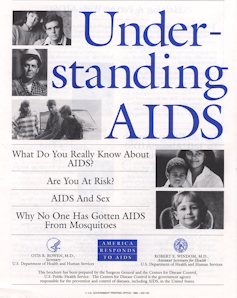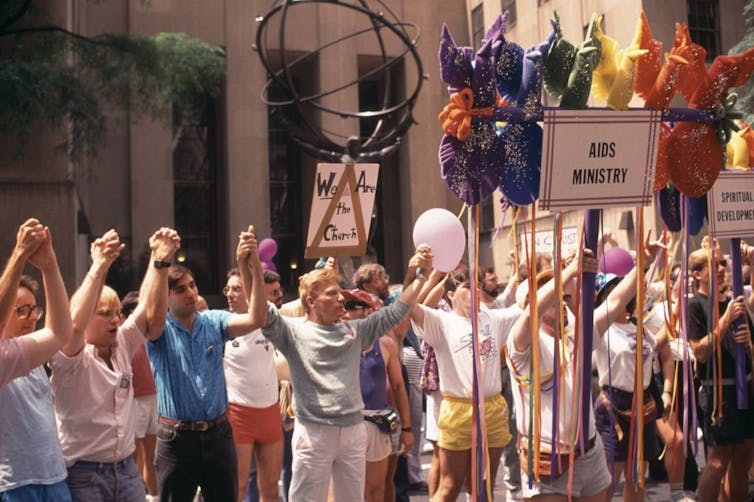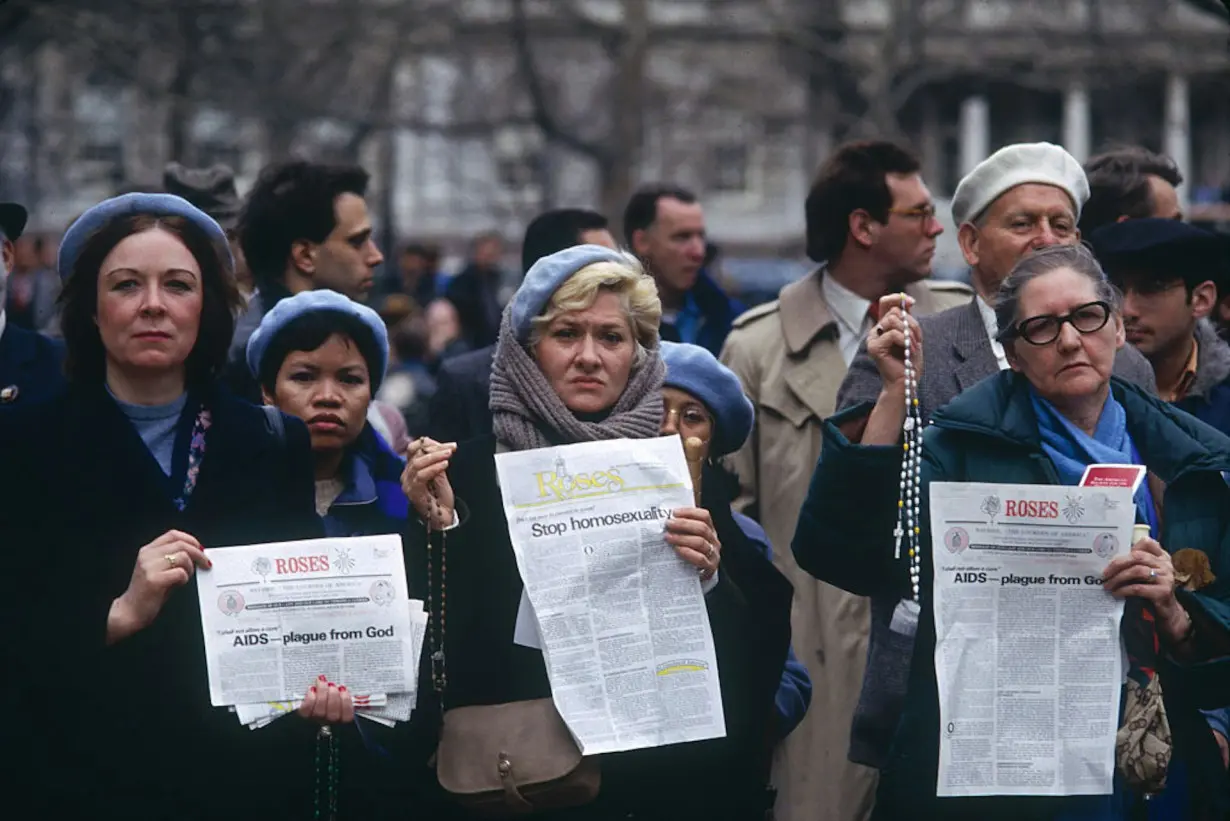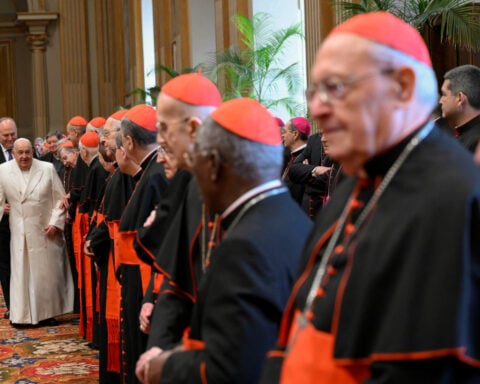In the 1970s, conservative Christian leaders had already warned the broader public about what they considered to be an epidemic of homosexuality. They argued that social acceptance of LGBTQ+ people was a sign of moral decline, and warned that if the United States did not stamp out this “moral disease,” the country would face the same fate as Sodom and Gomorrah, biblical cities destroyed by God.
In other words, the Christian right already had its own way to talk about homosexuality as an epidemic, as a threat to society itself. The AIDS crisis seemed to only confirm their belief in God’s wrath.
Medical and public health officials were not immune to this rhetoric. In the 1980s, at hospitals across New York, people readily referred to WOGS – the wrath of God syndrome. A physician at the Medical College of Georgia penned an editorial for Southern Medical Journal that asked whether AIDS fulfilled a biblical pronouncement about “the due penalty” for sexual sins and recommended conversion therapy for homosexuals.
In the White House, as historian Jennifer Brier has shown, President Ronald Reagan’s conservative advisers Gary Bauer and William Bennett formulated a strategy to fight AIDS that emphasized the moral righteousness of heterosexuality and abstinence outside of marriage.
They were frustrated to get pushback from the Reagan-appointed Surgeon General C. Everett Koop, a pediatric surgeon who had also become one of the leaders of the evangelical pro-life movement. He insisted that national AIDS policy focus on comprehensive sex education.

In 1988, Koop sent a mailer called Understanding AIDS to virtually every household in America. Conservatives balked at Koop’s approach, although he still prioritized abstinence for people who were unmarried as the best form of protection.
Bauer and Bennett complained that the flyer included information about condoms and described the risks of contagion through oral and anal sex. Phyllis Schlafly, the conservative Catholic crusader against feminism, abortion and gay rights, accused the surgeon general of trying to teach “safe sodomy” to third graders.
Beyond the Christian right
Not all conservative Christians understood AIDS to be God’s punishment for sexual sin. Many evangelical groups and Catholic leaders even pushed against that notion – yet still spoke of it in religious and moral terms.
Cardinal John O’Connor, the archbishop of New York, drew the ire of many AIDS activists when he spoke about AIDS at the Vatican in 1989. “Good morality,” he proclaimed, “is good medicine.”
Many Christians took more progressive positions. Southern Baptist ethicist Earl Shelp and chaplain Ronald Sunderland worked as research fellows at Texas Medical Center, where they first encountered people with AIDS. Together, they started one of the earliest AIDS ministry programs, which focused on helping gay men with AIDS without judgment.

And many queer and feminist Christian and Jewish leaders, including Jim Mitulski, Yvette Flunder and Yoel Kahn, forged queer-affirming and justice-oriented responses to the stigma of AIDS. They countered the idea that AIDS was a “gay disease,” but they also focused on how AIDS harmed populations that were often sidelined, including people of color, women and drug users.
What’s in a name?
Today, when I teach about the history of the HIV/AIDS crisis, my students tend to be confused by this early association with homosexuality. They associate AIDS with sub-Saharan Africa, which had become the epicenter of the pandemic by the 1990s.
Nevertheless, my students have grown up in a world where AIDS is far better understood. Thanks to the work of activists and scientists, far more people now know that HIV can be blocked by using condoms and sterile needles. Antiretroviral therapy has proven very effective in treating people able to obtain and tolerate the medicines.
Yet no matter how scientific or objective people hope to be, epidemics are shaped by culture. And studying that history helps us understand more about ourselves.

Anthony Petro does not work for, consult, own shares in or receive funding from any company or organization that would benefit from this article, and has disclosed no relevant affiliations beyond their academic appointment.
Source: The Conversation

 Lara Trump says she's removing herself from consideration to be Florida senator
Lara Trump says she's removing herself from consideration to be Florida senator
 Lara Trump withdraws from consideration to replace Rubio in US Senate
Lara Trump withdraws from consideration to replace Rubio in US Senate
 Trump taps 'Apprentice' producer as UK special envoy
Trump taps 'Apprentice' producer as UK special envoy
 Turkey will do 'whatever it takes' if Syria government cannot address Kurd militia issue, minister says
Turkey will do 'whatever it takes' if Syria government cannot address Kurd militia issue, minister says
 It's eggnog season. The boozy beverage dates back to medieval England but remains a holiday hit
It's eggnog season. The boozy beverage dates back to medieval England but remains a holiday hit
 France's Macron backs Ethiopia's debt restructuring efforts
France's Macron backs Ethiopia's debt restructuring efforts
 Pharmacy benefit manager reform fails to make the cut in federal funding package
Pharmacy benefit manager reform fails to make the cut in federal funding package
 Mexican president confident Congress will ban planting GM corn in 2025
Mexican president confident Congress will ban planting GM corn in 2025
 Texas beats Clemson 38-24, advances to face to Arizona State in College Football Playoff quarters
Texas beats Clemson 38-24, advances to face to Arizona State in College Football Playoff quarters
 Lamar Jackson and the Ravens draw even atop the AFC North, beating the 1st-place Steelers 34-17
Lamar Jackson and the Ravens draw even atop the AFC North, beating the 1st-place Steelers 34-17
 A group of Christian protesters in New York City hold leaflets that say 'AIDS is a plague from God' as they protest a gay rights bill in 1986.
A group of Christian protesters in New York City hold leaflets that say 'AIDS is a plague from God' as they protest a gay rights bill in 1986.







